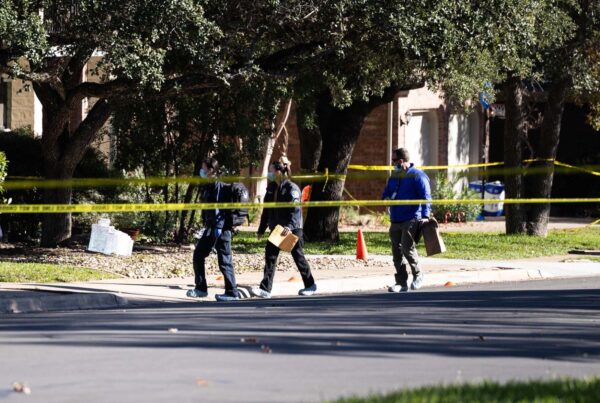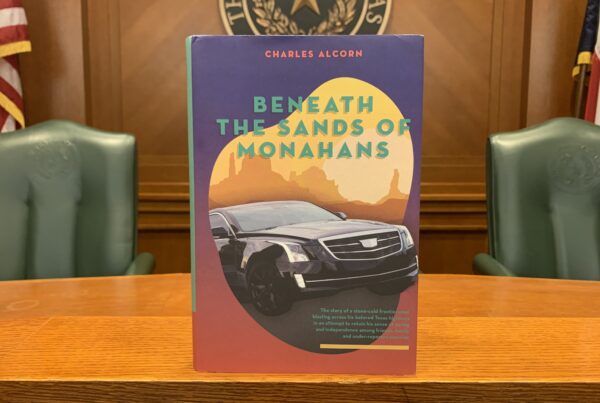More people are sentenced to death in Harris County than any other county in the U.S. Judges there have handed down the death penalty to nearly 300 defendants since it became legal again in 1976.
There are major problems with the machinery of this part of the judicial system, according to a new report called “Death by Design” from the Wren Collective, a criminal justice reform group.
The report takes a deep look at more than two dozen death penalty cases in Harris County. It describes a litany of failings on the part of attorneys and judges, as well as a system that makes it nearly impossible for someone to get a truly fair trial.
Jessica Brand, an attorney and founder of the Wren Collective, spoke to the Texas Standard about the report’s findings.
This transcript has been edited lightly for clarity:
Texas Standard: What are some of the top-line findings in this report, and how did you go about putting it together?
Jessica Brand: Well, we took a look at 28 cases out of Harris County where men were sentenced to death. And we read all of the post-conviction pleadings in those cases to see what lawyers at the trial level have missed. And I think this is important: They’re represented not by public defenders but by court-appointed attorneys – so private attorneys who bill their county for their representation.
We also interviewed judges, we interviewed lawyers, we interviewed advocates, we interviewed investigators. And our findings were pretty uniform, which is that the system is totally broken. We found in every case lawyers had missed just considerable evidence that might have convinced a jury to spare someone’s life or a prosecutor not to seek a death sentence.
We found lawyers who missed an intellectual disability claim – so people who had extremely low IQ, sometimes below 70. We found lawyers who missed just egregious examples of physical and sexual abuse that these men experienced as children. We found examples where lawyers missed extreme trauma and neglect, all the kinds of things that someone would want to know before they decided to sentence someone to death. And these were just not present.
So what is the issue here? That there are not the numbers or the quality of pro bono defenders out there? What’s going on?
So the way it works in Harris County – but in a lot of Texas and a lot of this country – is a judge will assign a private lawyer, and that lawyer bills the county. They’re paid; it’s not pro bono.
This is an enormous amount of work. I mean, death penalty cases can take up to 1,900 hours or more to prepare – and then if you go to trial, even more – so this is actually extremely costly. But part of the problem is lawyers are afraid to ask judges for as much money as they really take. And so as a result, they’re not always doing all of the work that they need to represent these clients.
There’s other reasons for the poor representation, but that’s one of them.
» GET MORE NEWS FROM AROUND THE STATE: Sign up for Texas Standard’s weekly newsletters
But isn’t this reviewable on appeal? I mean, this is something that anyone looking at the record, as you did, could bring up and push for a second review.
Yeah, well, there’s lots of problems with that. One is it’s just hard to overturn convictions. There’s a lot of inertia in the system once the jury’s sentenced someone to death or found them guilty. And there’s a standard of review. Judges don’t like to overturn convictions. So that’s problem number one.
That’s also sort of a terrible result for victims in these cases. I mean, people want closure. And if you’re going to fix the bad representation at trial on appeal, that means it opens all kinds of old wounds for the families of the people who have lost loved ones. So that’s not a great result for them, either.
And, of course, meanwhile, these men are sitting on death row, which is a terrible place. They’re not getting any of the treatment that they actually need. And so it’s awful for them as well. And of course, if you’re talking about innocent people – and sometimes people are exonerated – they’re also spending time on the row hoping against hope that their conviction is going to be overturned.
So appeal’s not really a great fix for what should be a trial right: to have effective and zealous representation.
Well, I could understand how some defense attorneys might find this report to be unfair, given the benefits of hindsight, with each case having its own unique circumstances. How would you respond to them?
I would say it’s not about them, you know. I mean, I’ve seen some of the quotes that’s come into the [Houston] Chronicle sort of defending this work: “The work is hard. It’s hard to run a small business.”
I was a public defender myself. My husband was a public defender himself. They’re right; the work is hard. But your duty is to the client. And these are the most broken individuals with the highest stakes, and they deserve effective representation.
What would you recommend, top-line things, that the judicial system or legislators could do?
In lots of places these cases are handled by a public defender’s office or by an independent office that’s solely focused on capital cases. And when that happens, the representation improves dramatically. That’s what happened in Virginia; there are places all across the country that do this.
And that’s what Harris County should do. If it’s going to keep pushing on with the machinery of death, it’s time for them to just stop doing this court appointment system – it doesn’t work; it’s never worked – and give these men the representation that they’re entitled. And that would mean an independent office that’s free of the judiciary and where there’s a culture and an ethos of representing clients zealously.















